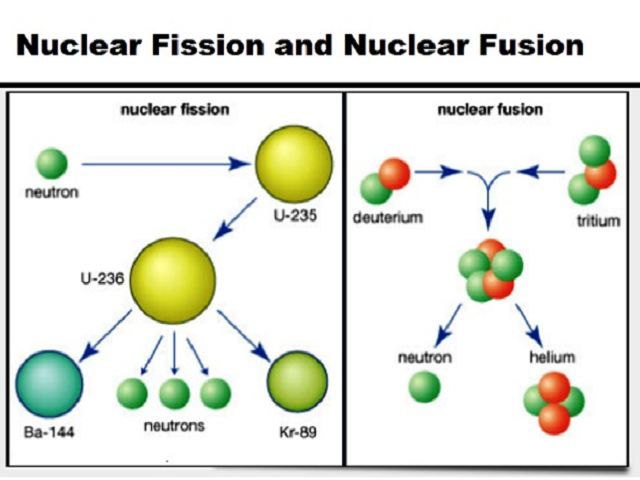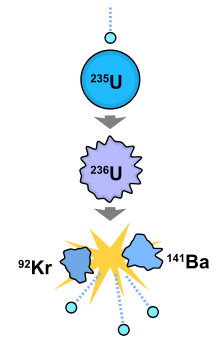Explain Briefly the Difference Between Nuclear Fission and Nuclear Fusion
The use of fission in power plants can help conserve fossil fuels. They are opposing processes and therefore very different.
The main difference between these two processes is that fission is the splitting of an atom into two or more smaller ones while fusion is the fusing of two or more smaller atoms into a larger one.

. The starting elements have a higher atomic number than that of the fission products. 8 rows Key Difference. Nuclear Fusion is the opposite of nuclear fission reaction in which heavy elements diffuse and form lighter elements.
Nuclear fusion is a reaction through which two or more light nuclei collide to form a heavier nucleus. Answer Fusion combines smaller nuclides into bigger nuclides while fission splits bigger parent nuclides into smaller ones emitting neutrons in the process. Plutonium 239 is used as a fuel in some nuclear reactors.
Explain briefly how stars like the Sun are thought to have been formed. 723 explain the difference between nuclear fusion and nuclear fission. For example uranium can fission to yield strontium and krypton.
The nuclear reaction in which a heavy nucleus is broken into smaller nuclei by releasing neutrons and energy is called nuclear fission. A Nuclear fission is used in nuclear power stations to generate electricity. Fission breaks atomic nuclei into smaller pieces.
Nuclear fusion takes place naturally such as in stars like the sun. 1 b Nuclear fusion also releases energy. Both are nuclear processes by which atoms are changed to produce energy.
What type of particle must be absorbed. Fusion occurs in stars such as the sun. Nuclear fission is used for nuclear power plants.
Fission is the splitting of a large atom into two or more smaller ones. Nuclear fission is a process of splitting of a heavier nucleus into two lighter nuclei. Fission and fusion are two physical processes that produce massive amounts of energy from atoms.
Explain briefly the difference between nuclear fission and nuclear fusion. Fission and fusion are two processes that alter the nucleus of an atom. It generally occurs in elements of low atomic mass.
In both the processes the total mass of the products is slightly less than the mass of the original nuclei. 8Obtain the expression for electric field at point aOutside a charged thin spherical shell. They yield millions of times more energy than other sources through nuclear reactions.
For nuclear fission to happen the nucleus must absorb a particle. Briefly describe current uses of nuclear fission and fusion. In physics an action always has an equal but opposite reaction.
BJust outside a charged thin spherical shell by using Gauss law 9Obtain an expression for electric field due to an infinitely long straight uniformly charged wire by using gauss law. The nuclear fusion process occurs in elements that have a low atomic number such as hydrogen. This process is used to produce hydrogen bomb it is also believed to be the source of energy of the sun and stars.
Nuclear fusion happens naturally in stars. Nuclear fission releases heat energy by splitting atoms. Fusion Two smaller nuclei collide and combine to form a larger nucleus.
Nuclear fusion happens at very high temperatures. A process in which two or more lighter atoms combine to create a heavy nucleus is called nuclear fusion. Fusion is the fusing of two or more lighter atoms into a larger one.
7State and explain Gausss law in electrostatics. A i Use the correct answer from. Fission reaction does not normally occur in nature.
Nuclear fission is the splitting of a large atomic nucleus 1 nuclear fusion is the joining of two atomic nuclei to form a larger one 1. Nuclear fusion is a process of combination of two light nuclei to form a heavier nuclei. You can check out the difference between the two in this video below.
Nuclear fission provides the energy in nuclear power plants and fusion is the source of the suns energy. A high temperature is needed to overcome the repulsion force between the nuclei. Nuclear Fusion This is the process in which two or more light nuclei of elements combine together to form a heavier nucleus with release of both energy and radiation.
Fission Larger nuclei are split into smaller nuclei. Why does nuclear fusion require high temperatures and pressures. Fission produces many highly radioactive particles.
Nuclear fusion is used by the sun. Simply put fission is the division of one atom into two and fusion is the combination of two lighter atoms into a larger one. The key difference between nuclear fusion and fission is that nuclear fusion is the combination of two or more atoms to create one large atom while nuclear fission is the division of a larger atom into two or smaller atomic particles.
Fusion joins atomic nuclei together. The element formed has more neutrons or more protons than that of the starting material. A i nuclear fission is the splitting of a large atomic nucleus do not accept particleatom for nucleus 1 nuclear fusion is the joining of two atomic nuclei to form a larger one do not accept particlesatoms for nuclei 1 ii energy accept heatradiationnuclear.
Nuclear fission and nuclear fusion are two processes that release energy. It generally occurs in elements of high atomic mass. Name another substance used as a fuel in some nuclear reactors 1 Uranium -235.

Difference Between Nuclear Fission And Nuclear Fusion Physics

What Is The Difference Between Nuclear Fission And Nuclear Fusion


Comments
Post a Comment